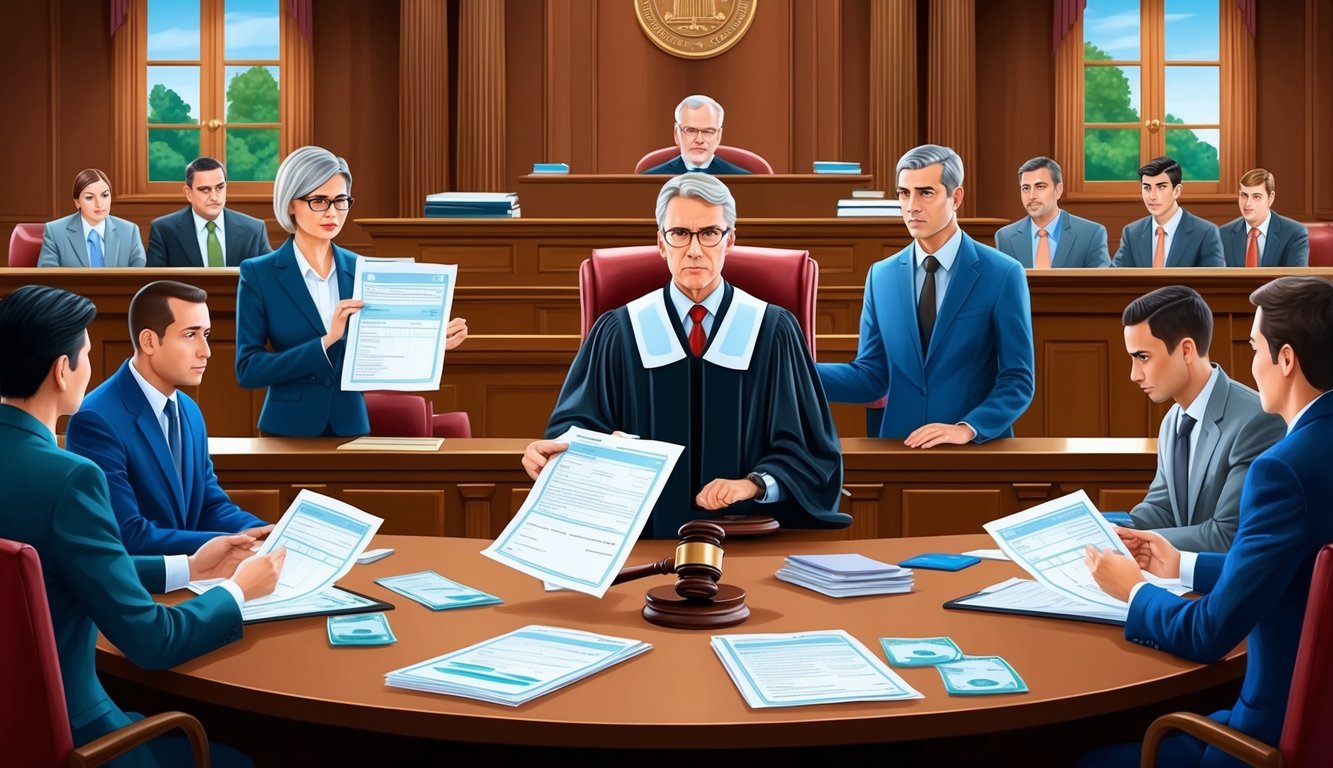Understanding General Liability Claims
General liability claims refer to the claims made by third parties for bodily injury, property damage, or advertising injury that you, as a business, may be responsible for.
These claims are crucial in the context of liability insurance.
When you purchase a general liability insurance policy, it typically covers several types of claims, which include:
- Bodily Injury: Claims related to physical injuries sustained by others on your property.
- Property Damage: Claims involving damage to someone else’s property caused by your business operations.
- Advertising Injury: Claims arising from unintentional harm due to advertising practices.
Your insurance coverage provides you with legal defense and covers settlement costs associated with valid claims, which can include substantial legal costs.
The specific terms of your policy will outline the coverage limits and any exclusions.
Not all incidents may be covered.
For instance, general liability insurance does not include professional liability or employee injuries.
By having general liability insurance, you protect your business from potential financial losses associated with these claims.
You should regularly review your policy to ensure adequate coverage and understand the types of claims that could arise in your industry.
Scope of Coverage Under General Liability Insurance

General liability insurance offers a wide range of protections for businesses.
It covers various claims related to property damage, bodily injury, personal injury, and more.
Understanding these coverage areas helps you manage risks effectively.
Property Damage and Bodily Injury
Your general liability policy covers claims for property damage caused by your business activities.
This includes situations where your actions result in damage to a client’s property or even damage to third-party properties.
Coverage typically extends to repairs or replacement costs, limiting your financial exposure.
Bodily injury claims involve physical harm caused to individuals due to your business operations.
This can encompass medical expenses, lost wages, and attorney fees incurred during legal proceedings.
The insurance covers settlements or judgments, providing a crucial safety net for business owners facing lawsuits.
Personal and Advertising Injury
Personal injury claims include allegations of defamation, slander, or invasion of privacy.
Your policy protects you against lawsuits arising from the dissemination of false information that harms an individual’s reputation.
Additionally, the coverage extends to advertising injury, which protects against claims related to misleading advertising or copyright infringement.
These coverage areas are vital as they can significantly impact your business’s reputation.
If you’re accused of such offenses, legal fees and potential settlements can be substantial without proper coverage.
Products-Completed Operations
Products-completed operations coverage addresses claims arising from your products or services after they have been sold or completed.
If a product you sold causes harm or damage after purchase, this coverage helps cover the claims against you.
For service-based businesses, this coverage applies when work you’ve completed results in a claim of damage or injury.
Faulty workmanship or inadequate services can lead to legal action, so this protection is essential for mitigating risks associated with your offerings.
Medical Payments
Medical payments coverage facilitates quick payouts for medical expenses incurred by injured parties on your premises, regardless of fault.
This insurance can cover minor injuries without the need for litigation, such as slip-and-fall incidents.
This provision is particularly beneficial as it helps maintain good relationships with clients and visitors.
By addressing medical costs directly, you can avoid larger liability claims and legal fees that may arise from more significant injuries.
Insurance Policies and Business Considerations

Understanding the various insurance policies available can significantly impact your business operations and risk management strategy.
It’s essential to align your coverage with your specific needs and responsibilities.
Insurance Policy Types and Benefits
Different insurance policies provide protection against various risks.
Here are key types to consider:
-
General Liability Insurance (CGL): Covers claims related to bodily injury, property damage, and personal injury. It’s vital for defending your business against lawsuits.
-
Commercial Auto Insurance: Protects vehicles used for business purposes, covering damages and liabilities from accidents.
-
Professional Liability Insurance: Also known as errors and omissions insurance, it safeguards against claims of negligence or inadequate work.
-
Workers’ Compensation Insurance: Offers coverage for employee injuries occurring during work, helping to manage medical costs and lost wages.
-
Commercial Property Insurance: Insures your buildings and equipment against risks like fire, theft, or natural disasters.
Each policy serves a distinct purpose, enhancing your business’s overall resilience in the face of potential claims.
Business Owner Responsibilities
As a business owner, you have specific responsibilities when it comes to maintaining adequate insurance coverage.
First, it’s crucial to assess your risks comprehensively.
This assessment will guide you in choosing appropriate insurance policies.
Obtaining a Certificate of Insurance may be required for contracts or leases, providing proof of your coverage.
Regularly reviewing and updating your policies ensures that you remain compliant and adequately protected.
Working with reliable insurance carriers can help you navigate complex options.
Additionally, consider enhancing your coverage with commercial umbrella insurance for extra liability protection beyond basic limits.
Always seek insurance quotes before making decisions to ensure you get the best value for your coverage needs.
Financial and Legal Implications of Claims

Understanding the financial and legal implications of general liability claims is crucial for your business.
These implications can significantly impact your financial health and operational stability.
Cost Analysis of Liability Claims
When a general liability claim arises, you need to evaluate potential costs carefully. Damages from a claim could include medical bills for third-party bodily injuries or repairs for third-party property damage.
Your insurance premium may increase, reflecting your claim history.
For small business owners, this can strain your budget, especially if claims are frequent.
You might also deal with legal costs related to defending against the claim.
It’s essential to analyze these costs in conjunction with potential liability risks.
Understanding these financial impacts can help you budget effectively and make informed decisions about your coverage.
Legal Defense and Settlements
When facing a liability claim, legal defense costs can accumulate quickly.
Hiring a lawyer to navigate these matters incurs significant expense.
Even if a claim seems minor, the need for legal expertise in settling or litigating claims can escalate costs.
Settlements may also vary widely depending on the claim’s merits.
Professional mistakes or negligence could lead to substantial payments that affect your business significantly.
If claims involve false advertising or other claims of misconduct, these can result in even higher defense costs.
Therefore, being prepared for legal challenges and understanding your coverage options is vital for your financial protection.
Risk Management and Insurance Selection

Selecting the right insurance is crucial for managing business risk effectively.
This process involves evaluating your specific business operations and understanding the types of coverage needed.
Consider the following aspects when choosing insurance:
- Insurance Carriers: Research different insurance carriers to find one with a strong reputation for handling claims promptly and fairly.
- Insurance Costs: Compare quotes to ensure you receive the best value. Remember that lower premiums may result in less coverage.
- Coverage Limits: Determine appropriate coverage limits based on your business size and potential exposures. Underinsuring can lead to significant financial loss.
- Insurance Premiums: Understand how premiums are calculated. Factors like the nature of your business, claims history, and risk management practices will influence costs.
For large companies, comprehensive commercial general liability coverage is often essential.
It protects against third-party property damage claims and general liability insurance claims that can arise from your operations.
Sole proprietors, too, should consider risk management to safeguard their assets.
Basic coverage can prevent financial setbacks from unexpected incidents.
In addition to general liability, you might also need professional liability or workers’ compensation insurance, depending on your industry.
Frequently Asked Questions

Understanding general liability claims is crucial for business owners and professionals alike.
This section addresses common inquiries related to claims, coverage, and the specific procedures involved in navigating general liability insurance.
What constitutes a general liability claim in a medical context?
In a medical context, a general liability claim may arise from incidents such as patient slips and falls within a facility or allegations of negligence that result in bodily injury.
These claims can also include accusations of improper care or equipment failure leading to harm.
It’s essential to recognize that the healthcare environment carries unique risks.
How does general liability insurance provide coverage for businesses?
General liability insurance protects your business against claims of bodily injury, property damage, and advertising injury claims.
This coverage can help pay for legal fees, settlements, and medical expenses that arise from incidents for which your business may be held responsible.
What are the different types of coverages provided under a Commercial General Liability (CGL) policy?
A Commercial General Liability (CGL) policy typically includes several coverages, such as bodily injury liability, property damage liability, personal and advertising injury liability, and medical payments coverage.
Each coverage type addresses specific risks that businesses might encounter during their operations.
What are the necessary steps to file a general liability insurance claim against a business?
To file a general liability insurance claim, start by notifying your insurance provider as soon as an incident occurs.
Provide detailed information regarding the event, including the date, location, and parties involved.
Be prepared to supply documentation such as photographs, witness statements, and any relevant communication.
How do ‘claims made’ and ‘occurrence’ policies differ within general liability insurance?
‘Claims made’ policies cover claims only if the policy is active when the claim is reported.
In contrast, ‘occurrence’ policies provide coverage if the incident happened during the policy period, regardless of when the claim is filed.
Understanding these differences is key to selecting the right insurance for your needs.
What distinguishes a property claim from a general liability claim?
A property claim typically involves damage to your own property or assets.
On the other hand, a general liability claim addresses claims made by third parties for injuries or damages they suffered due to your business activities.
This distinction is important for ensuring that you have the appropriate coverage for various risks.






